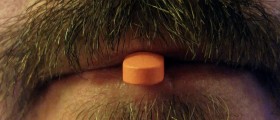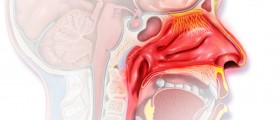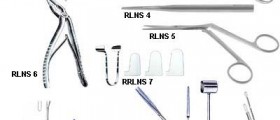
Sinus headaches include dull, throbbing pain in the face and generally in the front of the head, where the sinuses are located. They are caused by sinus problems, usually infection or inflammation. The pain seems to get worse while bending down, as well as in cold and damp weather. They start first thing in the morning and sometimes subside as the day goes by.
Symptoms of sinus headache
The main symptom of sinus headache is, of course, the pain. The pain is dull and deep, and there is also a feeling of pressure. During these headaches, the face is tender to touch and the pain becomes worse during head movements and especially when bending forwards.
Other symptoms may include runny nose, nasal congestion, yellow or greenish discharge from the nose, mild fever and fatigue.
Causes of sinus headaches
Sinus headaches are actually one of the symptoms of sinusitis, which is a congestion or an inflammation of the sinuses. Sinusitis can be caused by respiratory infections, such as common cold or flu, or by allergies, like hay fever.
Some of the risk factors for frequent sinus headaches include history of allergies, nasal polyps, swimming, diving, climbing to high altitudes, weakened immune system which makes a person prone to viral and bacterial infections.
Treatment for sinus headaches
The only successful way to treat sinus headaches is to address the underlying cause, which is the sinus infection or sinusitis. Sometimes the condition requires treatment with antibiotics, in case a doctor suspects the infection is caused by bacteria.
Other type of medication that the doctors usually prescribe for sinusitis includes corticosteroids. Nasal corticosteroids are usually prescription-only nasal sprays which reduce the inflammation inside the nose and the sinuses. Some of the commonly used corticosteroids include Beconase, Flonase, Nasacort and Nasonex.
Antihistamines are another option, and they are available both over the counter and on prescription. Antihistamines are often combined with decongestants, which are available as tablets or nasal sprays.
Since the pain caused by sinusitis can sometimes be quite severe, patients can take pain medications. Sometimes acute sinus headaches satisfy the criteria for migraines, and can be treated with migraine medications, for example triptans.
In some cases, if the sinusitis is chronic, recurring or very persistent, surgery may be the only option. This is an endoscopic procedure to remove polyps, bone spurs or to enlarge the sinus openings. Balloon rhinoplasty is another surgical option for this problem.
In people who are susceptible to sinus infections, sinus headaches can be prevented by using humidifiers and nasal sprays, inhaling vapors and treating allergies as soon as the symptoms set in.

















Your thoughts on this
Loading...